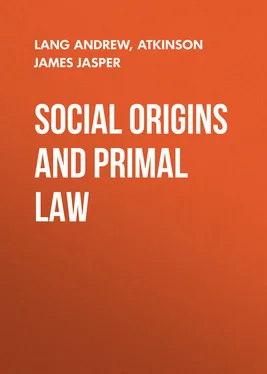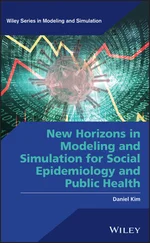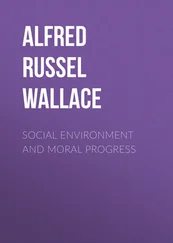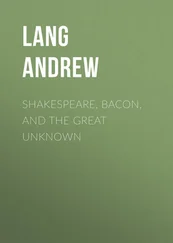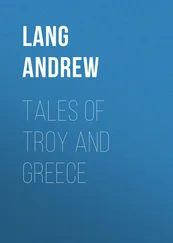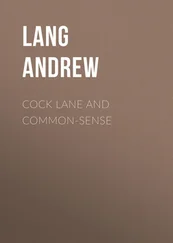Andrew Lang - Social Origins and Primal Law
Здесь есть возможность читать онлайн «Andrew Lang - Social Origins and Primal Law» — ознакомительный отрывок электронной книги совершенно бесплатно, а после прочтения отрывка купить полную версию. В некоторых случаях можно слушать аудио, скачать через торрент в формате fb2 и присутствует краткое содержание. Жанр: foreign_antique, foreign_prose, на английском языке. Описание произведения, (предисловие) а так же отзывы посетителей доступны на портале библиотеки ЛибКат.
- Название:Social Origins and Primal Law
- Автор:
- Жанр:
- Год:неизвестен
- ISBN:нет данных
- Рейтинг книги:3 / 5. Голосов: 1
-
Избранное:Добавить в избранное
- Отзывы:
-
Ваша оценка:
- 60
- 1
- 2
- 3
- 4
- 5
Social Origins and Primal Law: краткое содержание, описание и аннотация
Предлагаем к чтению аннотацию, описание, краткое содержание или предисловие (зависит от того, что написал сам автор книги «Social Origins and Primal Law»). Если вы не нашли необходимую информацию о книге — напишите в комментариях, мы постараемся отыскать её.
Social Origins and Primal Law — читать онлайн ознакомительный отрывок
Ниже представлен текст книги, разбитый по страницам. Система сохранения места последней прочитанной страницы, позволяет с удобством читать онлайн бесплатно книгу «Social Origins and Primal Law», без необходимости каждый раз заново искать на чём Вы остановились. Поставьте закладку, и сможете в любой момент перейти на страницу, на которой закончили чтение.
Интервал:
Закладка:
Mr. Howitt adds, 'If the two first intermarrying groups' ('phratries') 'had distinguished names, they were probably those of animals, and their totems, and, if so, the origin of Totemism would be so far back in the mist of ages, as to be beyond my vision.' In the chapter on the 'Origin of Totemism,' we try to penetrate 'the mist of ages,' and to see beyond the range of vision of Mr. Howitt. But the 'Origin of Totemism' cannot be beyond Mr. Howitt's range of vision, if he agrees with Mr. Fison that the totem kins were orderly evolved within the phratry, or were segmented out of the phratry, or split off, as colonies, from the phratry (Dr. Durkheim's theory), or were added to the phratry, for some reason.
It seems, then, that he does not commit himself to any of these four theories. He appears to confess to having no theory of the origin of Totemism, which, in his opinion, gave the names to the phratries, these being the result of the primary bisection. Probably his best plan would be to say 'the horde was bisected into two moieties, for exogamous purposes, and animal names, for the sake of distinction, were arbitrarily imposed on the phratry divisions.' But, then, what about the many totem kins within the phratry? We receive no solid theory about them. They were certainly not arbitrarily marked out later, within the phratry, for exogamous purposes which they do not fulfil. If they were picked up elsewhere, and added into the phratry, where did they come from? Crowds of totems were not going about, Mr. Howitt seems to think, before the bisection, because, if so, we saw hordes were not 'undivided,' before the bisection, but were already divided into totem kins.
Or shall we say that the undivided communes had already organised distinct co-operative magical totem groups, to do magic for the good of the food supply, plants and animals, but that these totem groups were not exogamous before the bisection? After the bisection two of these magical totem groups, say Eagle-Hawk and Crow, were selected, shall we guess, to give names to the two moieties or phratries? The other totem groups fell, or were meted out, some into Crow, some into Eagle-Hawk. This is a thinkable hypothesis, but it is fatal to the theory of subdivision, or of segmentation, or of evolution, as causes of totem kins within the phratries; and it is not suggested by Messrs. Fison and Howitt.
Thus we must construct for ourselves, later, a theory of the Origin of Totemism. We are actually constrained to make this effort, because it will probably be admitted that, having no theory, or hesitating between three or four theories, of the origin of totems and of totem kins, Messrs. Fison and Howitt produce an hypothesis of the evolution of Australian society which cannot be construed by us into an intelligible form.
Mr. Howitt elsewhere writes, 'The existence of the two exogamous intermarrying groups' ('phratries') 'seems to me almost to require the previous existence of an undivided commune, from the segmentation of which they arose.' 83 83 Organisation of Australian Tribes , p. 136.
But they, the phratries, were totemic, and why? Once again, why was the undivided commune divided? We know not the motive for, much less the means of effecting, such a great change 'in the beginning.'
In 1885, Messrs. Howitt and Fison were aware of, and expressed their sense of this difficulty (that of dividing people out into arbitrary groups) in the case of ancient Attica. Speaking of the γένος, or clan, in Attica, they combat the opinion of Harpocration, that the people were 'arbitrarily drafted into the γένη. 84 84 Harpocration s. v. γεννῆται Greek: genneitai.
Our authors remark, 'Ancient society – the more ancient – does not thus regulate itself. Nascitur non fit . One can understand a Kleisthenes redistributing into demes a civilised community which has grown into a State, but the notion of any such arbitrary distribution of men into γένη; in the beginning of things cannot be entertained for a moment.' 85 85 J. A. I. xiv. 160.
This being so, how can our authors maintain that, 'in the beginning of things,' given an 'undivided commune,' all its members were 'drafted' into one or other of two divisions, and again into totem groups. A subdivision of the 'phratries' into totem groups, by deliberate arrangement, is clearly as artificial and arbitrary as the scheme suggested by Harpocration, 'which cannot be entertained for a moment.'
We are speaking of 'the beginning of things,' not of the present state of things, in which we know that modifications of the rules, e.g. the division into eight 'classes,' are being deliberately adopted. 86 86 Spencer and Gillen, pp. 72, 420.
In 'the beginning of things,' as Messrs. Howitt and Fison, in 1885, maintained, society nascitur non fit . Our effort is to show the process of the birth of society before conscious and deliberate modifications were made to prevent marriages, of 'too near flesh.' Our criticism of Messrs. Fison and Howitt's theories may perhaps indicate that they are insufficient, or but dubiously intelligible. Something clear and consistent is required.
CHAPTER III
TOTEMS WITHIN THE PHRATRIES
AMERICAN SUPPORT OF THE AUTHOR'S HYPOTHESIS
The system which I advocate here, as to the smallness of the original human groups, and their later combination into larger unions, seems to have, as regards America, the support of the late Major Powell, the Director of the Bureau of Ethnology, and of Mr. McGee of the same department. This gentleman writes, 'Two postulates concerning primitive society, adopted by various ethnologic students of other countries, have been erroneously applied to the American aborigines … The first postulate is that primitive men were originally assembled in chaotic hordes, and that organised society was developed out of the chaotic mass by the segregation of groups …' This appears to be Mr. Hewitt's doctrine. In fact, Mr. McGee says, American research points, not to a primal horde, 'bisected' and 'subdivided' into an organised community, but to an early condition 'directly antithetic to the postulated horde, in which the scant population was segregated in small discrete bodies, probably family groups…' The process of advance was one of 'progressive combination rather than of continued differentiation… It would appear that the original definitely organised groups occasionally coalesced with other groups, both simple and compound, whereby they were elaborated in structure…' Mr. McGee adds, 'always with some loss in definiteness and permanence.' As far as concerns Australia, I do not feel sure that the last remark applies, but, on the whole, Mr. McGee's observations, couched in abstract terms, appear to fit what I have written, in concrete terms, about the probable evolution of Australian tribal society. 87 87 Ethnological Bureau, Annual Report , 1893-1894, pp. 200, 201.
The theory thus suggested makes little demand on deliberate legislation, as we shall see later.
DELIBERATE ARRANGEMENT
This I take to be important. It seems well to avoid, as far as possible, the hypothesis of deliberate legislation in times primeval, involving so sweeping a change as the legal establishment of exogamy through a decree based on common consent by an exogamous 'Bisection' consciously made. Exogamy must have been gradually evolved. But, if we begin with Mr. Howitt's original undivided commune, and suppose a deliberate bisection of it into two exogamous phratries, each somehow containing different totems; or if we suppose a tribe of only two totems, and imagine that the tribe deliberately made these totems exogamous, which they had not been before, and then subdivided them into many other totem groups, we see, indeed, why persons of the same totem may not intermarry. They now, after the decree, belong to the same exogamous 'phratry' within which marriage is deliberately forbidden. But, on this theory, I find no escape from the conclusion that the 'bisection' into 'phratries' was the result of a deliberate decree, intended to produce exogamy – for the bisection has not, and apparently cannot have, any other effect. Now I can neither imagine a motive for such a decree, nor any mode, in such early times, of procuring for it common consent. At this point we have laboured, and to it we shall return, observing that our hypothesis makes much less appeal to such early and deliberate legislation.
Читать дальшеИнтервал:
Закладка:
Похожие книги на «Social Origins and Primal Law»
Представляем Вашему вниманию похожие книги на «Social Origins and Primal Law» списком для выбора. Мы отобрали схожую по названию и смыслу литературу в надежде предоставить читателям больше вариантов отыскать новые, интересные, ещё непрочитанные произведения.
Обсуждение, отзывы о книге «Social Origins and Primal Law» и просто собственные мнения читателей. Оставьте ваши комментарии, напишите, что Вы думаете о произведении, его смысле или главных героях. Укажите что конкретно понравилось, а что нет, и почему Вы так считаете.
